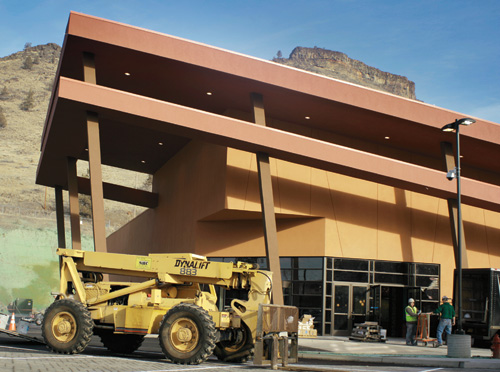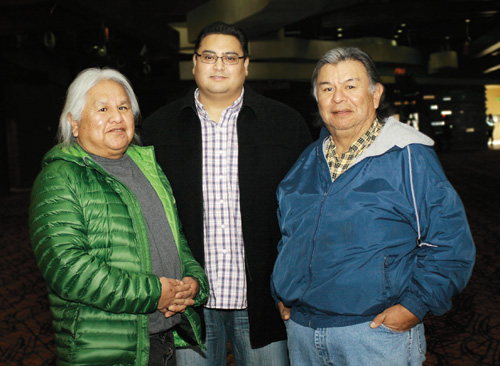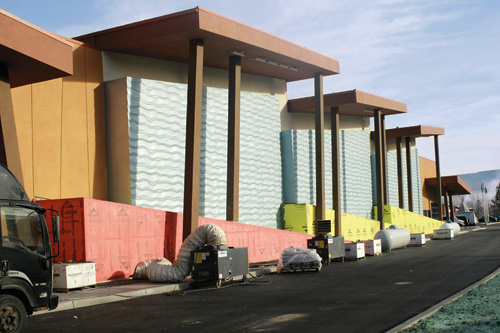 On a Tuesday in January, employees at the Kah-Nee-Ta tribal casino undertook an arduous task: dismantling 300 slot machines in four hours, to be reassembled at the casino’s new temporary location about 10 miles away on Highway 26
On a Tuesday in January, employees at the Kah-Nee-Ta tribal casino undertook an arduous task: dismantling 300 slot machines in four hours, to be reassembled at the casino’s new temporary location about 10 miles away on Highway 26
By Linda Baker
 |
Above: Construction crews work on the new Indian Head Casino on Highway 26 near the Warm Springs Museum. Below: Warm Springs tribal council members Reuben Henry, Scott Moses and Olney “JP” Patt Jr. voted last February to relocate the Kah-Nee-Ta casino. The new facility, which is expected to generat 200 jobs, is scheduled to open on Feb. 4.// Photos by Alexandra Shyshkina |
 |
On a Tuesday in January, employees at the Kah-Nee-Ta tribal casino undertook an arduous task: dismantling 300 slot machines in four hours, to be reassembled at the casino’s new temporary location about 10 miles away on Highway 26. “It was amazing,” says Ken Billingsley, manager of the Indian Head Casino, which is scheduled to open Feb. 4. Taking apart the machines was supposed to be at least a one-day project, says Billingsley. “But these people were all over it. Morale is sky high.”
The day after the dismantling, Billingsley and about a half dozen tribal leaders gathered at the construction site to discuss the reasons for moving the casino to its new location, across the highway from the Warm Springs Museum. The Kah-Nee-Ta gambling facility, which opened in 1995 and is now closed, was situated at the end of a long and winding road and generated about $3 million annually. The 40,000-square-foot temporary casino, almost twice the size of the original, is expected to generate about $12 million annually, along with 200 new jobs.
Despite the economic benefits, tribal members say the temporary casino is just that — a placeholder as the 5,040-member tribe continues to pursue a controversial off-reservation casino in Cascade Locks. An economic study commissioned by the tribe shows that Cascade Locks “is the best location to meet all the tribe’s needs,” says Deepak Sehgal, board chairman of Indian Head Casino. “We’re not taking our eyes off that.”
Like much of rural Oregon, the Confederated Tribes depended for many years on resource extraction; at its peak in the 1980s, an onsite mill produced 110 million board feet annually. The tribe’s focus on timber resources, as well as a conservative leadership style, caused Warm Springs “to miss the curve” when it came to tribal gaming opportunities, says Olney “JP” Patt Jr., a council member. Tribal leaders made the dubious decision to site the Kah-Nee-Tah casino in a remote location; they also missed a key 1988 deadline to purchase tribal trust land in Cascade Locks, a move that might have facilitated construction of the proposed venue in the Columbia River Gorge.
 |
The casino will have 22,000 square feet of office space and 18,000 square feet of gaming space.// Photo by Alexandra Shyshkina |
Today, output at the Warm Springs mill has dropped to 38 million board feet annually, and the reservation, one of the most impoverished in the state, has a 60% unemployment rate. “We’re in dire need of new jobs and revenue,” says Scott Moses, another council member. Although the tribe has several diversification strategies in mind, including a possible truck stop, store and biomass facility, moving the Indian Head casino was the easiest way to jump-start the local economy, Moses said. About 350 cars a day pass by Kah-Nee-Tah; 7,000 a day traverse Highway 26.
To capitalize on the increased traffic, casino managers are pursuing a clientele that “has never been marketed to before,” Billingsley says. “We’re going after recreation-type people, farmers, ranchers — cowboys are notorious gamblers.” Unlike the Kah-Nee-Ta facility, the new casino, which cost $13 million, will be open 24 hours. It also features a restaurant and snack bar. Kah-Nee-Tah, now minus a gambling venue, will be upgraded and rebranded as a family-friendly resort.
The temporary casino will only generate a fraction of the money of a Cascade Locks facility, tribal leaders caution. “We’re looking at approximately $100 million on that location,” Sehgal says. But as the battle over the Gorge venue continues — the proposed facility is opposed by Gov. John Kitzhaber and several environmental groups — the Confederated Tribes of Warm Springs are betting on the Highway 26 location as a step toward revitalization. “It gives the community hope and confidence the tribe is moving forward and that leadership is focused on getting jobs,” says Urbana Ross, the tribe’s chief operating officer.


